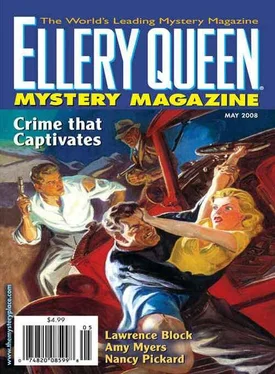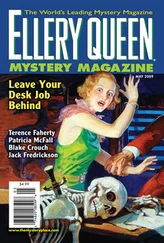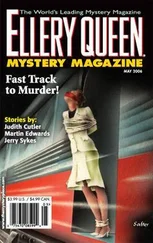Lisa Atkinson - Ellery Queen’s Mystery Magazine. Vol. 131, No. 5. Whole No. 801, May 2008
Здесь есть возможность читать онлайн «Lisa Atkinson - Ellery Queen’s Mystery Magazine. Vol. 131, No. 5. Whole No. 801, May 2008» весь текст электронной книги совершенно бесплатно (целиком полную версию без сокращений). В некоторых случаях можно слушать аудио, скачать через торрент в формате fb2 и присутствует краткое содержание. Город: New York, Год выпуска: 2008, ISBN: 2008, Издательство: Dell Magazines, Жанр: Детектив, на английском языке. Описание произведения, (предисловие) а так же отзывы посетителей доступны на портале библиотеки ЛибКат.
- Название:Ellery Queen’s Mystery Magazine. Vol. 131, No. 5. Whole No. 801, May 2008
- Автор:
- Издательство:Dell Magazines
- Жанр:
- Год:2008
- Город:New York
- ISBN:ISSN 0013-6328
- Рейтинг книги:5 / 5. Голосов: 1
-
Избранное:Добавить в избранное
- Отзывы:
-
Ваша оценка:
- 100
- 1
- 2
- 3
- 4
- 5
Ellery Queen’s Mystery Magazine. Vol. 131, No. 5. Whole No. 801, May 2008: краткое содержание, описание и аннотация
Предлагаем к чтению аннотацию, описание, краткое содержание или предисловие (зависит от того, что написал сам автор книги «Ellery Queen’s Mystery Magazine. Vol. 131, No. 5. Whole No. 801, May 2008»). Если вы не нашли необходимую информацию о книге — напишите в комментариях, мы постараемся отыскать её.
Ellery Queen’s Mystery Magazine. Vol. 131, No. 5. Whole No. 801, May 2008 — читать онлайн бесплатно полную книгу (весь текст) целиком
Ниже представлен текст книги, разбитый по страницам. Система сохранения места последней прочитанной страницы, позволяет с удобством читать онлайн бесплатно книгу «Ellery Queen’s Mystery Magazine. Vol. 131, No. 5. Whole No. 801, May 2008», без необходимости каждый раз заново искать на чём Вы остановились. Поставьте закладку, и сможете в любой момент перейти на страницу, на которой закончили чтение.
Интервал:
Закладка:
“And he shot himself, too?” enquired Auguste.
“No. The villain ran away into the crowd that had gathered. But a few years ago I recognised him as he returned to the scene of the crime. He was a country clergyman and admitted all to me. Unfortunately that was—” he paused delicately — “while I was under a different guise, and therefore bound by the secrets of the confessional. The burden is heavy, and this week I sensed him near at hand.”
“Who is he?” Auguste was torn between genuine curiosity and amusement at the seriousness with which his unobliging guest appeared to take the responsibilities of his job.
“Alas, my lips must still be sealed, Mr. Didier. I am, you must remember, a gentleman,” he answered gravely. “Another, if you please.” He held out his glass expectantly, but Auguste pretended not to see it, busying himself with clearing the table. He was growing very tired, especially of distressed gentlemen — and of distressed clergymen.
“A cigar?” the distressed gentleman enquired hopefully.
“The restaurant is locked at two a.m.,” Auguste said meaningfully. “There are but ten minutes—” His protest was quelled by a mournful sigh.
“Did I tell you of the sad murder of Adolphus Bracket?” floated the distressed gentleman’s voice behind him as Auguste wearily set off to fetch the best Havanas.
“Yes!” he howled. He was ignored.
“At the height of his career. I came to the Albion only days before that tragic occasion. Adolphus Bracket, that darling of the gods, strode the stage like a Colossus. Never, never shall I forget his interpretation of Eugene Aram. Dead, Mr. Didier, dead, killed by a mere envious underling, not fit to walk the same stage as he graced.”
That murder, too, Auguste had heard of. Early in 1875 Bracket’s body had been found stabbed in an alleyway off the Strand beside the Albion Theatre. He had been an actor universally applauded and greatly mourned. “Was the murderer ever caught?” he enquired.
“He fled the scene and the theatre. An Italian. I knew him well for I had worked with him in the provinces. Naturally, I was First Gentleman, and he merely the villain. He resented it greatly, just as he resented the great Adolphus Bracket. I would know him anywhere.”
Auguste tried to clear his tired brain. “Have you seen him since?” He supposed he should at least pretend to take these ramblings seriously.
“The terror by night, Mr. Didier. It is always with me,” the distressed gentleman informed him gravely.
Auguste tried again. “You believe that one of these three murderers wishes to murder you? Which one?”
The distressed gentleman bowed his head. “This very week — but no, my calling forbids me to speak.” A pause followed. “A brandy, perhaps?”
“Mr. Didier?”
Auguste looked up from his careful construction of a meringue swan. The voice was familiar, but what could have brought Inspector Egbert Rose of Scotland Yard to the Galaxy restaurant?
“A cup of warm chocolate, Inspector? An almond pastry?”
“Too rich for me, thank you.” The inspector eyed the proffered plate suspiciously. “I like a nice salmagundi myself — a little bit of everything, and you can be sure what you’re eating.”
Nevertheless Auguste noticed a wistful look on his face, as he conducted him to a table where they could converse.
“Did you know a Montague Phelps?” Egbert Rose continued.
The name meant nothing to Auguste.
“Beggar outside Romanos. Top hat, frock coat, good line in patter—”
Light dawned. “The distressed gentleman,” he exclaimed.
“Very,” Egbert Rose commented drily. “He’s dead. Found stabbed in the small hours near his lodgings in Henrietta Street.”
Only the night before that, Auguste realised with shock, he had watched at the restaurant door as the distressed gentleman walked out into the darkness, his top-hatted figure and cane briefly silhouetted in a pool of light from a gas standard. Then he had stepped briskly out of it, and disappeared forever. Auguste was filled with remorse as he remembered his impatience to be rid of a guest who had merely outstayed his welcome.
“A random robbery?” he asked, appalled. Even as he did so, however, he recalled the distressed gentleman’s “I am to be murdered myself, sir.” A terrible thought struck him: Had he indeed had reason to fear for his life? Had a murderer returned, determined to silence a witness? Had he, Auguste Didier, dismissed a genuine fear as melodramatic patter?
“Perhaps,” came Egbert Rose’s noncommittal reply.
“But why are you here, Inspector?” Auguste frowned. Despite his help to Egbert Rose on one or two cases in the past, he was hardly a substitute for the entire Metropolitan Police detective department when it came to solving crimes.
“Your Mr. Phelps was still alive when he was found. He managed to say a few words to the constable who found him.”
“And what were they?”
“The constable took them to be the name of his killer. They were: Mr. Auguste Didier.” Egbert Rose’s gimlet eyes fixed themselves firmly on him.
“You cannot believe that,” Auguste stammered in shock. Surely the inspector knew him well enough not to think that he, a master chef, could be guilty of murder?
Egbert Rose relented. “Knowing you, Mr. Didier, no. But I need some explanation of why you should have been on the victim’s mind.”
What had earlier been a delightful meringue and Chantilly swan began to look extremely unappealing. “It was because he had dined here, not last night but the evening before. I had offered him a free dinner since it was cold outside. He told me he thought he might be murdered. I did not take him seriously,” Auguste replied miserably, “as his patter was always about local murders.”
“Perhaps someone did take him seriously,” Egbert grunted. “Tell me what he talked about.”
Auguste promptly did so, and then, for the next few days, was forced to agonise in frustration. The inspector had left to “look into it” after Auguste had faithfully recounted all the three stories to him; Egbert Rose had also informed him he would be returning. To arrest him, perhaps? Did he really think that only a day after that fateful meal Auguste would have pursued Phelps into the darkness to kill him?
Auguste felt he was in danger of becoming a Strand eccentric himself. Surely nothing could link him to this terrible crime? He would have been only fourteen when even the most recent of the murders was committed. Nevertheless, he realised it was only his word as to what Montague Phelps had claimed might be the danger facing him.
At last the inspector returned, a week after his first visit. The waiting was over, and that at least was a relief.
Not quite over, it seemed. “One of those almond pastries wouldn’t go amiss, Mr. Didier.”
Auguste speedily obliged and then he could wait no longer. “Did you discover anything that would help clear me, Inspector?”
“Not enough,” was the far from cheering reply. “The owner of that house with the locked-up chamber, Joseph Taylor, has been dead for thirty years.”
Auguste had mixed feelings. “So Montague Phelps couldn’t have seen or heard of him in London recently.” If this applied to all the cases, then the answer would lie between a random assailant and Mr. Auguste Didier. And he knew which would have to receive priority from Scotland Yard.
“Agreed,” the inspector said drily. “But he left his house to his brother on condition that the room should still remain locked. Eventually, as Phelps told you, the hotel bought it, and lo and behold there was the skeleton of the missing bride, large crinoline and all.”
There was something odd there. Auguste did some quick arithmetic. “But the bridegroom locked the door fifty years ago, in eighteen forty-four. I’m sure there were no crinolines then.”
Читать дальшеИнтервал:
Закладка:
Похожие книги на «Ellery Queen’s Mystery Magazine. Vol. 131, No. 5. Whole No. 801, May 2008»
Представляем Вашему вниманию похожие книги на «Ellery Queen’s Mystery Magazine. Vol. 131, No. 5. Whole No. 801, May 2008» списком для выбора. Мы отобрали схожую по названию и смыслу литературу в надежде предоставить читателям больше вариантов отыскать новые, интересные, ещё непрочитанные произведения.
Обсуждение, отзывы о книге «Ellery Queen’s Mystery Magazine. Vol. 131, No. 5. Whole No. 801, May 2008» и просто собственные мнения читателей. Оставьте ваши комментарии, напишите, что Вы думаете о произведении, его смысле или главных героях. Укажите что конкретно понравилось, а что нет, и почему Вы так считаете.












